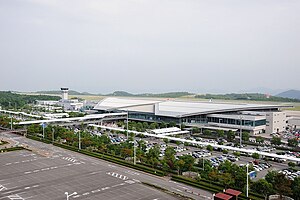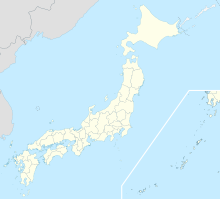Hiroshima Airport (広島空港, Hiroshima Kūkō) (IATA: HIJ, ICAO: RJOA) is an international airport in the city of Mihara, Hiroshima Prefecture, Japan. Located 50 km (31 mi) east[2] of Hiroshima, it is the largest airport in the Chugoku and Shikoku region, and the second busiest in the region after Matsuyama Airport. 80% of the airport's domestic traffic is to and from Haneda Airport in Tokyo. In 2022, the Hiroshima-Haneda route was the tenth-busiest domestic air route in Japan.
Hiroshima Airport 広島空港 Hiroshima Kūkō | |||||||||||
|---|---|---|---|---|---|---|---|---|---|---|---|
 | |||||||||||
| Summary | |||||||||||
| Airport type | Public | ||||||||||
| Operator | Hiroshima International Airport Co., Ltd (広島国際空港株式会社) | ||||||||||
| Serves | Hiroshima Prefecture | ||||||||||
| Location | Mihara, Hiroshima Prefecture, Japan | ||||||||||
| Opened | 29 October 1993 | ||||||||||
| Elevation AMSL | 1,086 ft / 331 m | ||||||||||
| Coordinates | 34°26′10″N 132°55′10″E / 34.43611°N 132.91944°E | ||||||||||
| Website | www | ||||||||||
| Map | |||||||||||
 | |||||||||||
| Runways | |||||||||||
| |||||||||||
| Statistics (2015) | |||||||||||
| |||||||||||
Source: Japanese Ministry of Land, Infrastructure, Transport and Tourism[1] | |||||||||||
History
editThe New Hiroshima Airport was opened for public use on 29 October 1993 as a replacement for the old Hiroshima Airport, which was renamed Hiroshima-Nishi Airport. The old airport was located in a more central waterfront location, but was too small to handle widebody aircraft and could not be expanded. In 1994, the New Hiroshima Airport was renamed to just Hiroshima Airport after the old airport was renamed.[3]
The airport's single runway opened with a length of 2,500 m (700 m longer than Hiroshima-Nishi). The runway was then extended to 3,000 m in 2001, and its ILS was upgraded to CAT-IIIa in 2008 and CAT-IIIb in 2009.[3]
Terminal
editThe airport only has one terminal with separated departures and arrivals facilities for domestic and international flights and seven lettered gates (A through D domestic; E through G international). The international and domestic areas are separated landside by a central atrium. The domestic departures lounge has separate JAL and ANA airline lounges, while the international area has one shared airport lounge.[4]
Airlines and destinations
editStatistics
editGraphs are unavailable due to technical issues. Updates on reimplementing the Graph extension, which will be known as the Chart extension, can be found on Phabricator and on MediaWiki.org. |
| Year | Passengers | Year | Passengers |
|---|---|---|---|
| 1995 | 2,652,270 | 1998 | 2,989,733 |
| 1996 | 2,761,389 | 1999 | 3,263,171 |
| 1997 | 2,849,670 | 2000 | 3,330,770 |
| 2011 | 2,499,855 | 2012 | 2,693,652 |
| 2013 | 2,622,309 | 2014 | 2,677,134 |
Ground transportation
editRoad
editThe airport has no direct expressway connection but is located near the San'yō Expressway. Limousine bus service to and from the downtown Hiroshima Bus Terminal is scheduled at 53 minutes but is often subject to traffic delays.[15] Hiroshima Station is accessible by bus in 45 minutes. Bus service is also available to Shiraichi Station, Fukuyama Station, Kure Station and Mihara Station.[16]
Rail
editUnusually among major Japanese airports, Hiroshima Airport has no railway station. The closest station is Shiraichi Station on the San'yō Main Line, and planners have proposed connecting the airport to this station with a new line, or to build a new station on the San'yō Shinkansen high-speed rail line. The West Japan Railway Company, which operates both lines, has rejected proposals for connections because of the high cost involved and to maintain JR's competitiveness with commercial airlines for passenger traffic to and from Hiroshima.
Accidents and incidents
edit- On 14 April 2015, Asiana Airlines Flight 162, operated by Airbus A320 HL-7762 departed the runway on landing. The aircraft was operating an international scheduled passenger flight from Incheon International Airport, Seoul, South Korea. At least 27 of the 81 people on board were injured (25 passengers and two crew members).[17][18][19] Initial indications were that the aircraft had hit off the localizer antenna belonging to the airport's Instrument landing system as it was coming in to land.[19] The airport was closed through 16 April and reopened on 17 April with the ILS offline, resulting in flight cancellations during periods of adverse weather.[20]
References
editThis article incorporates public domain material from the Air Force Historical Research Agency
- ^ "Hiroshima Airport" (PDF). Japanese Ministry of Land, Infrastructure, Transport and Tourism. Archived from the original (PDF) on 21 October 2016. Retrieved 7 January 2017.
- ^ "AIS Japan". Aisjapan.mlit.go.jp. Archived from the original on 17 May 2016.
- ^ Jump up to: a b 広島空港 (in Japanese). 大阪航空局. Archived from the original on 6 December 2014. Retrieved 27 April 2015.
- ^ "2F 出発ロビー・チケットカウンター | ターミナルマップ | 広島空港". Hij.airport.jp.
- ^ "Mainland Chinese Carriers August – October 2023 Japan Network – 30JUL23". Aeroroutes. Retrieved 31 July 2023.
- ^ China Airlines Northeast Asia NW22 Service Changes – 27OCT22 Aeroroutes. 27 October 2022.
- ^ "东航9月国际航班计划". Weibo. 7 September 2023. Retrieved 9 September 2023.
- ^ "HK Express Operates Exclusive Direct Flights to Hiroshima, Japan from 1 November". HK Express. Retrieved 30 August 2024.
- ^ "HK Express Resumes Hiroshima Service in Nov 2024". Aeroroutes. Retrieved 30 August 2024.
- ^ "Jeju Air Adds Hiroshima Service in 3Q23". Aeroroutes. Retrieved 5 June 2023.
- ^ "Spring Airlines Japan delays launch until August 1".
- ^ "VietJet Air Adds Hanoi – Hiroshima Service in NS24". Aeroroutes. Retrieved 24 January 2024.
- ^ "Airport usage" (PDF) (in Japanese). Archived from the original (PDF) on 25 January 2012.
- ^ "Airport usage".
- ^ "広島―東京間、航空会社の逆襲なるか 新幹線シェア伸ばす". Nihon Keizai Shimbun. 31 December 2011. Retrieved 27 April 2015.
- ^ "Access Information". Hiroshima Airport. Retrieved 27 April 2015.
- ^ Kaminsky-Morrow, David. "Asiana A320 involved in Hiroshima landing incident". Flight Global. Retrieved 14 April 2015.
- ^ Yeo, Ghim-Lay. "-Investigators sent to Asiana A320 runway excursion in Hiroshima". Flight Global. Retrieved 14 April 2015.
- ^ Jump up to: a b AFP (15 April 2015). "Asiana plane skids off runway in Japan, leaving 20 injured". The Daily Telegraph (online edition). Retrieved 15 April 2015.
- ^ Yoshikawa, Tadayuki (25 April 2015). "広島空港、アシアナ事故機撤去へ 26日から運用条件緩和". Aviation Wire. Retrieved 27 April 2015.
External links
editMedia related to Hiroshima Airport at Wikimedia Commons


